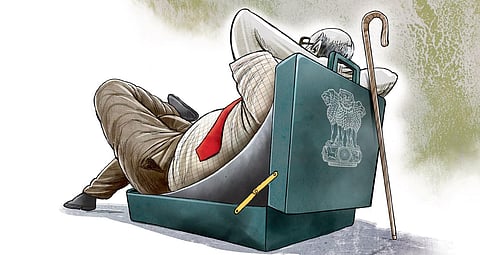

The nomination of Ranjan Gogoi, former Chief Justice of India, to the Rajya Sabha has set many tongues wagging. This is not the first time that it has happened to a judge of the Supreme Court. It isn’t illegal or unconstitutional either. Such appointments/ nominations do, however, raise a number of ethical issues and are pertinent not only in the context of what happened in this case but also the larger issue of post-retirement engagements of all civil servants. I distinctly remember a discussion when I was Secretary, Ministry of Coal, Government of India, when an issue of financial bonds by a couple of Public Sector Undertakings (PSUs) came up for consideration. Both of these entities belonged to different ministries but were under the same minister and both these PSUs were flush with funds. In an informal chat with the Secretary of the other ministry, both of us agreed that there was no need to float bonds.
However, during the formal meeting, the other Secretary chose to remain silent whereas I immediately opposed the issue of such bonds by the PSU that was within the purview of the ministry that I headed. This PSU was saved from this unnecessary financial burden but the one of the other ministry continues to suffer. On the one hand, ‘surplus’ cash was being sucked out of these PSUs by the Centre to plug the budgetary deficit; on the other, they were pushed into procuring expensive funds from the market. The Secretary of the other department was subsequently ‘rewarded’ with an assignment for his silence on an issue where he could have or should have protected the interest of the PSU.
A large number of civil servants opt for post-retirement jobs in the government. Most of them would have worked in the government for three decades or more. Yet they prefer government assignments. This raises a number of questions, some of which are ethical in nature: 1) Should a government servant apply for a job in the government after retirement? 2) Should a government servant accept an assignment in the government after retirement? However, before we attempt to answer these questions, let us look at the reasons why a civil servant looks at post-retirement assignments. It could be on the following counts: 1) Having enjoyed the sheltered existence that a government job offers, a civil servant finds it difficult to swim in the ‘open sea’. There is a sense of insecurity that pushes him to remain in the oyster shell. 2) There are certain ‘perks’, including official accommodation, that continue to be available.
Having got used to such ‘perks’, it becomes difficult for him to give them up. 3) There could be a financial need to continue in a government job as the pension is only equivalent to half of the last pay drawn. 4) Having worked in the government for so long, there is uncertainty surrounding one’s value in the ‘open market’. 5) There is a sense of satisfaction, a sense of entitlement and authority within the government. It isn’t easy to give these up. One or a combination of the above factors lead a civil servant to apply for a post-retirement assignment.
There isn’t anything illegal about applying for such assignments because the government itself enables and calls for applications for such assignments. There is also an additional argument. Why should the enormous talent and experience within the civil service be wasted instead of being harnessed by the government on the superannuation of a civil servant? This indeed is a valid argument. However, the key issue is an ethical one. Should a civil servant apply for such assignments after having held top assignments like Secretaries to the government? Will it not affect his conduct, attitude, objectivity and performance if he has a post-retirement carrot dangling before him? Having seen the functioning of the government from very close quarters, I have no doubt that in a number of cases it does. They start toeing the line of those who can help them obtain a post-retirement assignment in the government. It prevents officers from airing their views freely and frankly in the interest of their organisation under the apprehension that their personal interest could be adversely affected.
Their lack of objectivity (in some cases collusion) results in enormous loss to the organisation, though they benefit personally and climb the bureaucratic ladder, reach the top and even end up getting post-retirement assignments. There have been some cases where even civil servants who have enjoyed a reasonably sound reputation begin to change as they approach superannuation. Every government is only too willing and happy to reward those who play ball. The signal to other civil servants is clear. Toe the line and get rewarded. On a number of occasions these rewards are bestowed irrespective of the experience or the competence of the officers concerned. These are rewards for ‘services rendered’, not very different from a ‘bakshish’. However, as mentioned earlier, bureaucratic talent can’t be allowed to go waste. It needs to be harnessed after retirement.
There are indeed a large number of civil servants who truly deserve to be and are indeed engaged by the government after they superannuate. Only the methodology of post-retirement engagement needs to undergo a change. An institution like the UPSC can be tasked with shortlisting the candidates for post-retirement assignments. The officer will then not feel beholden to the government for the assignment. It will virtually eliminate the quidpro- quo attitude that is currently the order of the day. It would be wrong not to use the services of those civil servants who have acquired enormous experience and expertise during their career. However, the criteria for their selection should be their competence and integrity and not servility and/ or allegiance. This can and should be done in the interest of better governance. (With excerpts from the author’s forthcoming book Ethical Dilemmas of a Civil Servant)
ANIL SWARUP
Former Secretary, School Education and Literacy, GoI Email: swarup8@yahoo.com